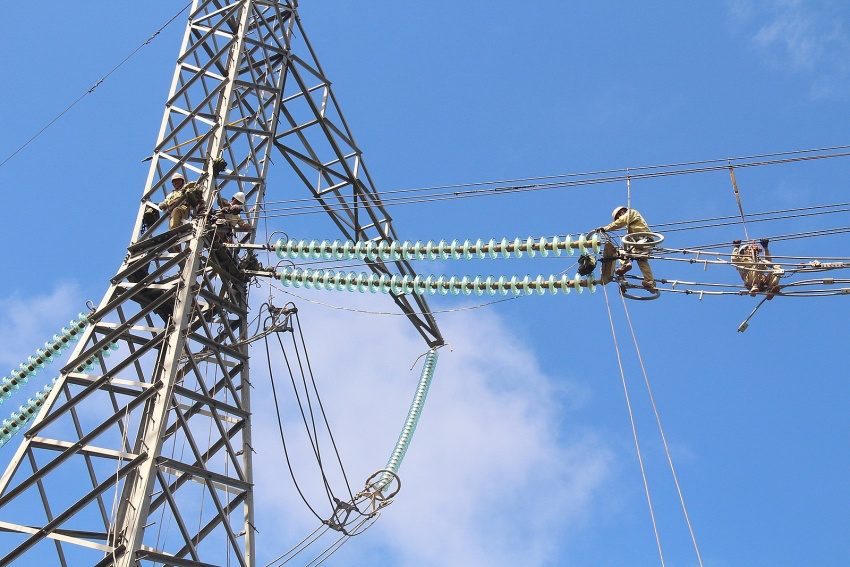Coal supply moves shoring up generation of power
 |
| It is projected that coal demand for power generation will be boosted before the end of the year |
On September 13, Vietnam Electricity (EVN), Vietnam National Coal and Mineral Industries Group (Vinacomin), and Northeast Corporation signed a cooperation agreement for coal to supply electricity.
Under the agreement, Vinacomin and Northeast Corporation will supply 56.48 million tonnes of coal to EVN’s coal-fired power plants.
“We are working with Vinacomin and Northeast Corporation to secure a sufficient coal supply for our coal-fired power plants using anthracite coal from January 2024,” said EVN president Tran Dinh Nhan. “We have completed the plan to provide additional coal to coal-fired power plants in operation to ensure future demand.”
In 2023, Vinacomin has signed coal purchasing contracts for 22 thermal power plants with an output of 38.52 million tonnes of coal. From now to the end of the decade, EVN’s coal-fired power plants will generate about 40-42 billion kWh per year, which equals about 28 million tonnes of coal and surpasses the coal supply capacity in the long-term contract, Nhan explained.
EVN, Vinacomin, and Northeast Corporation are participating in discussions about the long-term coal supply to ensure sufficient fuel for factories from 2024 to the end of the operating period, which is expected in 2035.
According to EVN, there are many challenges in supplying coal for power generation in 2023 due to shrinking coal production. The coal demand for thermal power plants is growing, given the improvement in industrial production.
In August, the index of industrial production was estimated to rise by 2.9 per cent over the previous month and 2.6 per cent over the same period last year, the General Statistics Office reported.
In Vietnam, coal is still an important source of fuel to generate electricity. “Vinacomin must import about 17 million tonnes of coal to ensure the supply of 46.48 million tonnes of coal in 2024,” said Ngo Hoang Ngan, chairman of the Board of Directors at Vinacomin.
He added that there was mounting pressure to supply sufficient coal to power households from both production and import sources.
“The company’s coal production capacity is hindered by hassles such as licence applications, licence extensions, and limits on the capacity of coal and mineral mining licences due to unsynchronised planning and policy,” Ngan said. “Secondly, imported coal prices remain high after a record increase in 2022. In the first seven months of 2023, Vinacomin imported 5.7 million tonnes of coal, up 78 per cent over the same period in 2022.”
According to a report on the Power Development Plan VIII by the Institute of Energy, the price of imported coal depends on fluctuations in the world energy market. Coal prices are predicted to reach $140 per tonne by 2025. In 2022, the average price of imported coal was about $218 per tonne, according to the General Department of Vietnam Customs.
Nguyen Van Vy, vice president of the Vietnam Energy Association, said, “Vietnam should seek measures to import coal early and increase domestic coal production to meet the power generation demand in the dry season next year.”
Vinacomin forecasts that coal demand for power generation will rebound in November after the decline of the rainy season.
There are wide and unpredictable fluctuations in the world coal market, which contains many risks. “By diversifying its long-term coal supply from several countries, Vietnam will reduce its dependence on certain markets,” Vy said.
At this time, the coal demand in the global market has eased compared to last year. However, coal prices remain high and it is hard to find a coal supply. In the first seven months of 2023, the average price of imported coal reached $147 per tonne, lower than $255 per tonne in the same period of 2022.
Vy added that the government could consider building a national coal reserve system and encouraging domestic enterprises to acquire coal mines abroad.
| Commercial coal production is predicted to reach around 57.88 million tonnes in 2023. Among them, domestically produced commercial and imported coal represent 44.68 million and 13.2 million tonnes, respectively, according to the Department of Petroleum and Coal under the Ministry of Industry and Trade. It is forecast that the volume of imported coal will fluctuate at around 70-75 million tonnes per year, according to the report on approval of Vinacomin’s production, business, and investment plan for 2021-2025. According to the Power Development Plan VIII, the proportion of coal thermal power in the energy mix will decrease from nearly 29 per cent in 2020 to 20.5 per cent in 2030. Electricity produced from coal power sources will decrease rapidly, from 46.5 per cent in 2020 to 34.8 per cent by 2030. No new coal-fired power plants will be approved after 2030. |
 | Coal continues to be vital for power generation As a result of government intervention and support, the amount of coal used for power generation exceeded 20 million tonnes during the first half of this year. |
 | Liquefied natural gas among strongest solutions in transitioning from coal With up to a 50 per cent lower carbon footprint than coal, liquefied natural gas (LNG) can be adjusted to increase greener electricity when available. |
What the stars mean:
★ Poor ★ ★ Promising ★★★ Good ★★★★ Very good ★★★★★ Exceptional
 Tag:
Tag:
Related Contents
Latest News
More News
- Trung Nam-Sideros River consortium wins bid for LNG venture (January 30, 2026 | 11:16)
- Vietnam moves towards market-based fuel management with E10 rollout (January 30, 2026 | 11:10)
- Envision Energy, REE Group partner on 128MW wind projects (January 30, 2026 | 10:58)
- Vingroup consults on carbon credits for electric vehicle charging network (January 28, 2026 | 11:04)
- Bac Ai Pumped Storage Hydropower Plant to enter peak construction phase (January 27, 2026 | 08:00)
- ASEAN could scale up sustainable aviation fuel by 2050 (January 24, 2026 | 10:19)
- 64,000 hectares of sea allocated for offshore wind surveys (January 22, 2026 | 20:23)
- EVN secures financing for Quang Trach II LNG power plant (January 17, 2026 | 15:55)
- PC1 teams up with DENZAI on regional wind projects (January 16, 2026 | 21:18)
- Innovation and ESG practices drive green transition in the digital era (January 16, 2026 | 16:51)





















 Mobile Version
Mobile Version